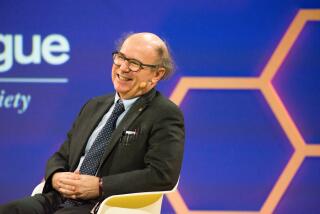Book Review : A Biology Uncircumscribed by DNA
- Share via
Toward a New Philosophy of Biology: Observations of an Evolutionist by Ernst Mayr (Harvard University Press: $35: 640 pages)
Knowledge--what is known--has been compared to a circle surrounded by what is unknown. As the amount of knowledge increases, so does the diameter of the circle. But the circumference, which borders the unknown, increases even more.
Since Watson and Crick figured out the structure of DNA 35 years ago, biologists have done very well at increasing the circle of microbiology. They have unraveled the genetic code that governs who and what each person is. Yet, following the law of circles, these answers have opened a Pandora’s box of new questions, including whether biology really is just a branch of chemistry, which, in turn, would be just a branch of physics.
The reduction of biology to chemistry is far from complete, of course. There is much that biologists still don’t know about the workings of DNA. But they have learned a lot, and they are sure to learn much more. Some say it is just a matter of time until they have a complete chemical description of DNA and how it works. Not so fast, others say. There is a limit. People are not just bags of DNA.
Influential Biologist
Ernst Mayr, 84, the dean of American evolutionary biologists, whose ideas have influenced evolutionary theory through most of this century, is in the second group. He believes that biology is ultimately unique and not reducible to another science. You can put together all the DNA you want, he says, and you still won’t have life.
“Attempts to reduce biology and its theories to physics have been a failure,” he asserts in the opening essay of “Toward a New Philosophy of Biology,” a collection of his papers and essays on the speculative aspects of biology. “Does this mean that a unification of science is impossible? Not in the least. All it means is that such a unification cannot be achieved by reducing biology to physics.”
He recognizes that arguing along these lines opens him to the charge of vitalism--the discredited belief that there is some “life force” that distinguishes living from non-living things. But Mayr pleads not guilty to the charge. Rather, he says, the laws of physics are not broad enough to encompass all of science.
“Some of the leaders of quantum mechanics, such as Bohr, Schrodinger, Heisenberg, and Pauli, postulated that someday someone would discover physical laws in organisms that were different from those which operate in inert matter,” Mayr writes. “Indeed, when Max Delbruck switched from physics to biology, one of his original objectives was to discover such laws.”
Still an Open Question
But neither Bohr nor Schrodinger nor Heisenberg nor Pauli nor Delbruck ever discovered such laws. So it remains an open question whether they exist and haven’t been found yet or whether no such laws exist. As with most important debates, which side one takes depends more on temperament than on logic. People adopt whichever side seems most comfortable to them and assemble the appropriate reasons afterward.
Mayr argues that living systems are inherently different from inanimate ones, which is why biology can never be reduced to chemistry or physics. “Attempts to ‘reduce’ biological systems to the level of simple physico-chemical processes have failed because during the reduction the systems lost their specifically biological properties,” he writes on the first page of this collection, and he repeatedly returns to the theme.
In fact, many of the papers in the book are a gloss on this central idea, which finds its most vociferous and persuasive presentation in these pages. He argues further that traditional philosophies of science do not adequately account for the special nature of biology.
For example, predictability is considered a key feature of a good scientific theory. Using the theory, you should be able to make predictions that can be confirmed (or refuted) by experiment. Yet evolution can make no such predictions. Does this mean that evolution is not a valid theory? Of course not, says Mayr. Evolution is unshakeable. What it means is that the philosophy of science that describes physics does not describe biology.
Technical and Historical
Unfortunately, though Mayr is one of the foremost biologists around, many of the papers in this volume are technical and historical and will appeal primarily to other professionals. For all of Mayr’s strengths--and they are many--Lewis Thomas he isn’t.
In his long and distinguished career, Mayr has been a prolific writer. In his magnum opus of 1982, “The Growth of Biological Thought,” he laid out the thoughts and conclusions of his life’s work, and he continues to refine those ideas in this collection. He straddles no fences. He has views on all subjects, and he is eager to share them.
In a profile published in Science ’84 magazine, Mayr described his rhetorical style: “I put the statement very dogmatic and absolute. But if the opponents come up with arguments, then I compromise on a synthesis.”
Not a bad way to proceed. It always gets attention, even if you don’t fully mean what you seem to be saying.
Though the reading is sometimes tough, it is a pleasure to be in the company of a mind so vibrant and still exploring the boundary between the circle of what is known and the vast expanse of what isn’t.




